Dover Christian Church
Established in 1824
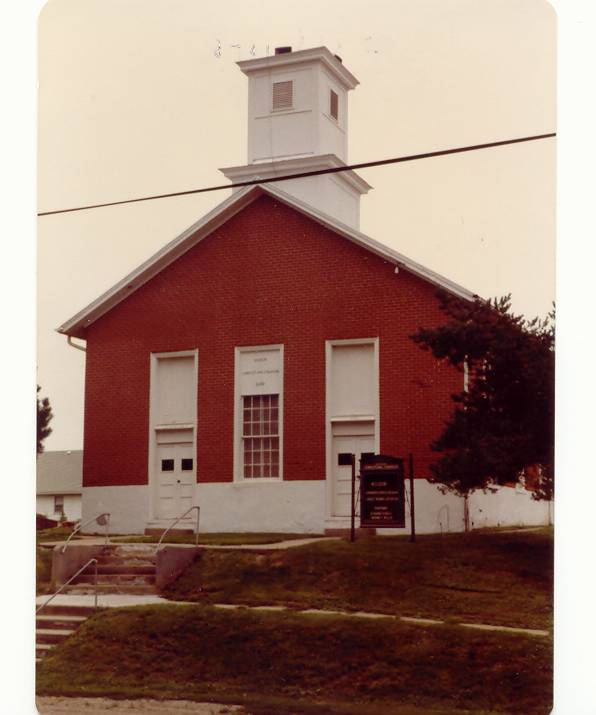
Dover Christian Church Building Built In 1848
![]()
J. W. McGarvey The Dover Years 1853-1862
John William McGarvey was born in Hopkinsville, Kentucky, March 1, 1829. He died in Lexington, Kentucky, October 6, 1911. Following his graduation from Bethany College, July 4, 1850, his next twelve years were spent preaching and teaching the gospel in Missouri. Nine of those twelve years were spent preaching in Dover Missouri, Lafayette County, from March, 1853 until the spring of 1862, when he accepted the work in Lexington, Kentucky.
Dover is a short distance south of the Missouri River almost exactly fifty miles due east from Kansas City. It was in one of the richest agricultural sections of the state and the citizens were mainly from Virginia and Kentucky. The Christian church at Dover claims to be one of the oldest congregations in Missouri; originally organized in 1824 as a “New Light” church, it had a mourner’s bench, and sprinkled adults as well as infants. These practices were contrary to the Bible, and were given up when men like T. M. Allen, Allen Wright, Moses Lard and many others encouraged them to embrace the restoration of New Testament Christianity, having agreed to take the Bible and the Bible alone as their rule of faith and practice It was not long till they were led out of their errors and unscriptural practices and became fully identified with the New Testament church. The historic Dover Christian Church building that stands today was built in 1848. The site for the building was donated by Solomon Cox and the bricks were kilned and the masonry constructed by Edwin Carter; the wood structure was by Benjamin Stark and Samuel Hodges. A balcony built for slaves has been removed, but otherwise it remains practically as it was originally. (Taken from the memory book of Lillian Hodges Gordon - copies in my possession - BG)
Before the building was built, the August meetings were started and held on the second Lord’s day in August, running back continuously from 1824 with the exception of a single year during the Civil War. According to a personal diary of Dr. H.G. Harwood, one of the elders at that time, “nearly every preacher of any prominence in the brotherhood preached in these meetings” (It would have been what we would call a lectureship today, with several speakers- BG). The August meetings were held at what was called Phluger’s Pond “people would come from miles around in wagons, to hear men such as Alexander Campbell, S.S. Church, John (Raccoon) Smith, T.P. and Henry Haley, Allen Wright and many others.” (Gordon memory book). It was in the 1890’s when the instrument was brought in and many members left as a result.
In August of 1852, McGarvey, in company with Alexander Proctor, held a meeting at Dover, Missouri, Lafayette County, the two speaking alternately. A note taken from the memory book of Lillian Hodges Gordon states, “Proctor and McGarvey rode up I went out and spoke to them in the street. They stopped and supped at Allison’s. Fri. Aug. 6, 1852.” It was some time later after this meeting that McGarvey was invited to become the minister of the Dover church. He accepted, and in January 1853, he gave up his school at Fayette, Missouri where he had been teaching, and for the remainder of his Missouri days, Dover was his home. McGarvey’s relationship with the church was most delightful. During his ministry there it grew in numbers, in spirituality and in reputation. Again, he divided his time among other churches and in evangelistic activity.
Shortly after moving to Dover, McGarvey was married. The bride was Miss Otwayana Frances Hix, the daughter of Mr. Otway Bird Hix, a prominent citizen of Fayette. The date of the wedding, March 23, 1853 was selected. Alexander Proctor officiated at the wedding.
For three years McGarvey and his wife boarded with the family of one of the elders of the church whose farm was three miles from town. A strong attachment developed between the two families. McGarvey says, “I never had a warmer friend than Robert Campbell.” During their stay in the Campbell household their first child was born in April, 1854. It was named Loulie. After the coming of this child they rented a house and began housekeeping. There was need of a school in the Dover community and McGarvey, in cooperation with E. C. White, formed a stock company and erected a building to serve as a boarding school for young ladies. It seems that Mr. White furnished the money but since he was unmarried, McGarvey was essential to the management of the boarding department. After two years White married and assumed full control of the school. This left McGarvey free to devote all of his energies to his preaching. His evangelistic work and his preaching for other churches often required him to make long and difficult journeys. This was especially true when the weather became severe in winter. He has left an account of one journey of twenty miles, which he took on a Saturday with the thermometer registering twenty below zero. He tells us how thoroughly he was wrapped and that he did not at the time suffer from the cold but for several days he felt a sensation of chill and with that common sense which characterized all of his actions he decided that in the future he would not risk such exposure. Apparently this did not cause him to hesitate at baptisms. He tells of baptizing in the Missouri river when the ice was a foot thick. He mentions baptizing delicate ladies in wintry streams but never heard of one suffering injury from it. He describes the glow of warmth and of renewed energy, which followed and compensated for the momentary chill. He ends his narrative by adding: “Our Lord knew what he was doing when he appointed this ordinance to be observed in every climate and country where sinful men reside.”
In addition to acquiring for himself a reputation of being an able, conscientious and worthy preacher, he took considerable interest in innovations that were bringing division into the Lord’s Church. McGarvey spoke out against the instrument. "It is manifest that we cannot adopt the practice without abandoning the obvious and only ground on which a restoration of primitive Christianity can be accomplished, or on which the plea for it can be maintained. Such is my profound conviction, and consequently, the question with me is not one concerning the choice or rejection of an expedient, but the maintenance or abandonment of a fundamental and necessary principle." (J. W. McGarvey, Apostolic Times And What Shall We Do About the Organ?)
Debates at that time were not infrequent and were often attended by enormous crowds. It was a much-discussed question then as to the nature and influence, which debates exerted. Probably their influence was deeper and more wholesome than the present age is disposed to admit and their power for good would have been even greater had it not been the tendency for some debaters to become rough, coarse, and determined on gaining victory at any price. They constantly belittled their opponents, heaping ridicule upon them and the doctrines they espoused. This was not true of McGarvey. By nature he was an educator and his method of conducting a debate would impart insight and information to any man that gave heed to it.
He possessed a number of native talents that admirably fitted him to be a skillful debater. In the first place, his Irish inheritance gave him a love for argument and controversy, and in his preaching, his preference, he tells us, was always for the argumentative. At this stage of his life there were probably few things in which McGarvey would have taken more delight than a good stiff debate with a well-informed opponent.
Another natural characteristic for debating which he possessed was a sense of humor. Never on his part would he become loud and boistrous. His words would be spontaneous and natural, flowing easily out of the circumstances of the moment. McGarvey would always be courteous and gentlemanly but this does not mean that his replies would lack point. Often they would fairly blister and his opponent would be disposed to feel that he had departed from the standard of kindliness.
Another endowment as a debater was that he never lost control of himself, He was always calm, in perfect mastery of his feelings, never excited, always well balanced. He would never, like some debaters, shout and cover his confusion by mere noise. It was characteristic of him whatever he was doing, to be quiet, reserved and yet wonderfully direct and pointed. He usually created the impression that he could far surpass what he was doing if he cared to make the effort.
During these Dover years McGarvey attended at least two debates carried on by others. He and T. P. Haley rode seventy-five miles to Trenton, Missouri to hear a debate between Benjamin Franklin and a Methodist preacher. It was his first meeting with Franklin and McGarvey was greatly impressed with him. McGarvey also attended a debate held at Brunswick, Missouri, between another Methodist preacher named Caples and Moses E. Lard. (Raccoon John Smith was also in attendance at this debate, Note added SDH, web editor). McGarvey himself during these Dover years conducted three debates, one with a Methodist, one with a Presbyterian, and one with a Universalist. His most impressive appearance in this line of activity, however, was at Paducah, Kentucky. Briefly the circumstances were these:
In 1859 Dr. J. F. Hendrick, a Presbyterian preacher of great ability and of considerable reputation, accepted the pastorate of the church in Paducah and early in his ministry gave a series of discourses on baptism in which he took issue with both the Baptists and the Disciples and publicly arraigned both of them. The two churches united in a plan to have someone reply to these addresses and the Disciples were to select the man to make the reply. Dr. Hendrick had published a book on the subject and a young preacher living in Paducah had taken careful notes of his addresses. These were to be supplied to the invited speaker and were to be the material upon which he was to base his replies.
This young preacher was I. B. Grubbs and he has left a detailed account of the impression created by Dr. Hendrick’s addresses and of McGarvey ’s reply. The preacher for the Paducah Christian Church was John C. Walden. The Baptists had made a very liberal offer to provide the building for the meeting and to bear the major part of the expenses; Mr. Walden was to secure McGarvey. Walden accordingly sought out McGarvey and had a conversation with him but was so little impressed by his appearance that he did not offer the invitation, in fact never mentioned the subject to him. He returned to Hopson and told him of his failure to act, giving as his reason that there must be no mistake in selecting the man for Paducah. Hopson again urged him to secure McGarvey and gave his personal assurance that there would be no failure. Walden acted on this advice and arranged a date when McGarvey was to deliver some three or four addresses in reply to Dr. Hendrick. Upon McGarvey’s arrival by steamboat, a number of interested people met him at the wharf but they too were so unimpressed by this man of unimposing stature and round head that some of them did not even greet him, and one Baptist offered to pay his return expenses to Missouri if it could be arranged. But that night the large Baptist Church was packed to the doors. The opening prayer impressed the audience with its simplicity and its humility. Dr. Hendrick’s points were presented one by one and answered with such ease and clearness that soon the audience was won to McGarvey’s side. At the close of the meeting one man exclaimed, “Stock has advanced one hundred per cent.” The sentiment of the entire community was revolutionized. The Christian church before had been small and it’s building unpretentious. It began to grow. Successful meetings were held and in an incredibly short time it became one of the strong churches of the city. The McGarvey addresses had no inconsiderable part in producing this result.
During these Dover days McGarvey also began to write for the papers, and his articles were received with favor. He wrote occasionally for the Millennial Harbinger and contributed more frequently for the American Christian Review, which was the most widely read paper of the Church at this time. It was also at this time he began his commentary on Acts, that to this day is considered a masterpiece.
As the political strife that culminated in the Civil War became intense McGarvey took a stand against secession and held that it was against the teaching of Christ and his apostles for Christians to take up arms. This he preached and advocated in his articles published in the papers. He and thirteen other preachers of Missouri appealed to Christians not to participate in the war. They made five points against such a course. (1) Christians could not participate in a fraternal strife; (2) The unity of the church must be maintained; (3) War destroys the Christian characters of those who participate in it; (4) A united course of action would give the brotherhood great power when the war closed; (5) Non-participation would harmonize with the policy of early Christianity. Hence Christians were urged to promote peace.
At first they were encouraged to believe that a majority of the church accepted their sentiments, but as the conflict began, such views were regarded as treason in the North and as disloyalty to the cause of the South. Few papers would any longer publish articles advocating such a policy. McGarvey continued to preach it to the end but he exerted little influence except over the select few. Even his own church in Dover was divided and some hotheads began to find fault with certain actions of his. He had been accustomed to holding meetings once a month for the black brethren only. Objections were urged against “black brethren, gathering in large numbers”. The war brought many other annoyances. After about a year his work began to be hampered. Attendance fell off; people were little interested in preaching; support of the preacher began to be neglected. McGarvey was seeking some secular occupation that would provide support for his wife, and three children. It was at this time, (1862) an invitation to become the minister of the church in Lexington, Kentucky was extended to him and accepted.
McGarvey tells of one event during his days at Dover, how on one occasion, in the fall of 1861, a regiment of German soldiers occupied Lexington, Missouri and fortified themselves on the campus of the Masonic College. Confederate Captain, Joe Shelby, had organized a company composed mostly of young men in and about Dover, and he was encamped with them in a grove on the road from Dover to Lexington. A friend of McGarvey, E. C. White, was to be married at Pleasant Hill in Cass County, and had engaged McGarvey’s services for the occasion. The place was forty miles away and the road led through Shelby’s camp and close by the fort in Lexington. Intending to make the trip on horseback, McGarvey had mounted his horse to start when the sound of cannons nearby startled the town. It was soon understood that bombshells were being fired from a steamboat in the river toward Shelby’s Camp. The shells were bursting high in the air but near enough to the camp to frighten the raw recruits, most of whom had never before heard a shell explode. McGarvey waited till the bombardment ceased and then started on his journey. He found Shelby and his men in the road near their camp, mounted and ready for a flight or fight as occasion might require. He told them his mission and asked if the way was open. Shelby replied that “the Dutch” (Northern troops), were in possession of the Tabanse Bridge about half a mile ahead, but that if he would turn to the left and cross at a ford about a mile above, he could come around in their rear and go on without hindrance. In making this detour he passed the home of his brother-in-law, Thomas B. Campbell, and seeing the necessity of making greater speed than he had intended, he borrowed his buggy. On coming again to the main road, instead of being in the rear of the Federal troops, he found himself in front of them. Shelby had thought the Northern troops had possession of the bridge, but they believed Shelby had it and they had halted about a mile from it. The Colonel in command questioned McGarvey closely as to who he was, where he was going, and what he had seen of Shelby’s men. McGarvey answered all his questions without evasion. The Colonel immediately ordered his force to advance. McGarvey thought that he would now be permitted to go on his way, but the Colonel ordered a big German with musket in hand to get into the buggy with him and follow close in the rear of his soldiers. Shelby had dug some trenches on the slope of the hill rising on his side of the creek. The Colonel approached the bridge very cautiously, fearful the trenches were occupied. His men, like Shelby’s, were raw recruits and a sudden blast from thirty or forty shotguns would have devastated them. McGarvey’s own position too, would have been a perilous one. At best, at the end of the skirmish McGarvey would doubtless have been arrested as a spy because he had reported Shelby’s men as having left the bridge. After passing over the bridge without harm, and having sent soldiers to explore the woods beyond, the Colonel concluded all was well and told McGarvey that he might go on his way. McGarvey was relieved of the unwelcome company of the big soldier, but he had now been so much delayed it was impossible for him to be at the wedding in time, so he went home and reported the adventure. McGarvey said this was the nearest that he had come to being shot and imprisoned in those times of peril.
-Bill Goring, Lee's Summit, Missouri
![]()
Directions To Dover Christian Church
From Kansas City, Missouri, travel east on I-70 to Exit 49, Highway 13, and travel north through Higginsville. Turn right on Hwy. 213 north out of Higginsville. Go about six miles and turn right on Hwy. 24. Go into Dover and go to the last street before leaving town. On your left you will see the Dover Christian Church. You can see it from Highway 24.
![]()
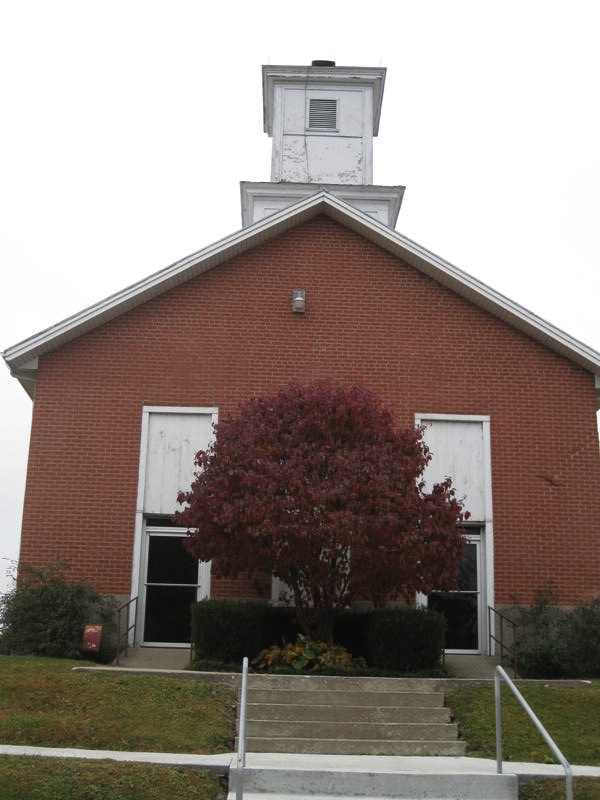
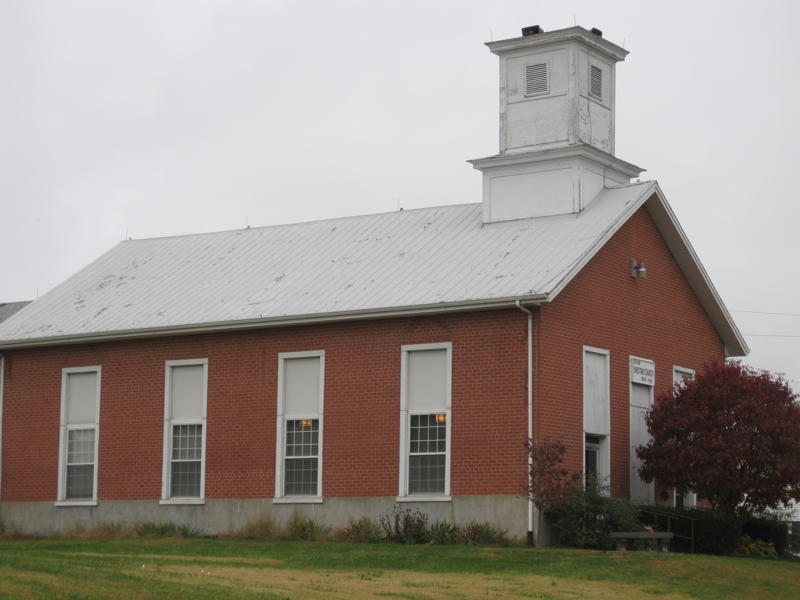
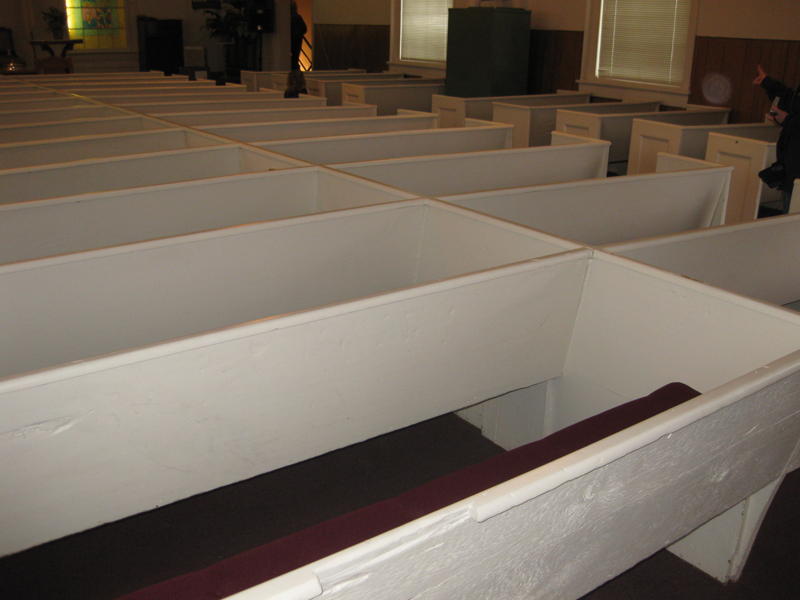
Original Pews Still Being Used At Dover
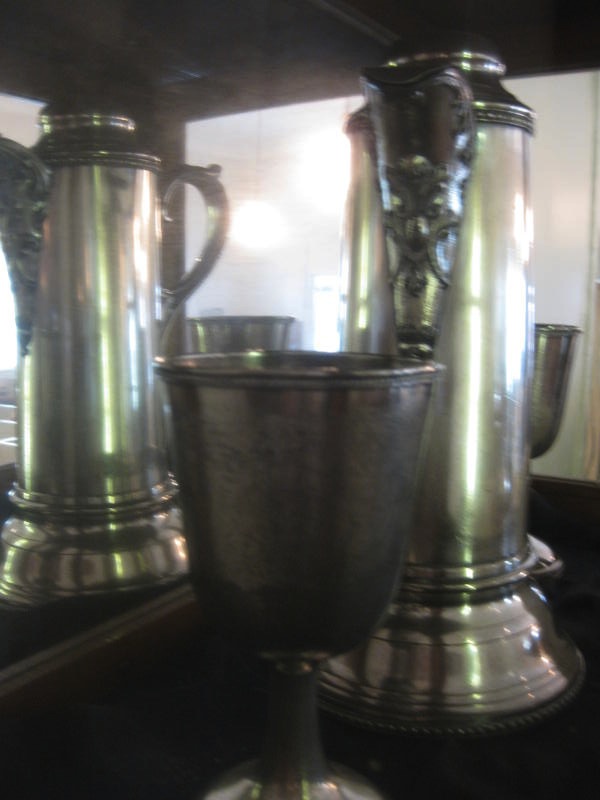
Old Communion Service Used
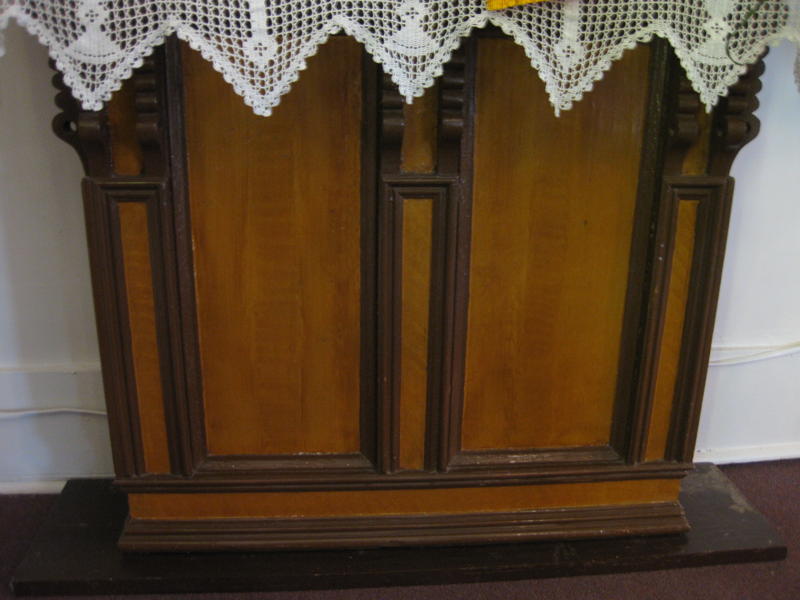
Pulpit Used By J.W. McGarvey At Dover Church
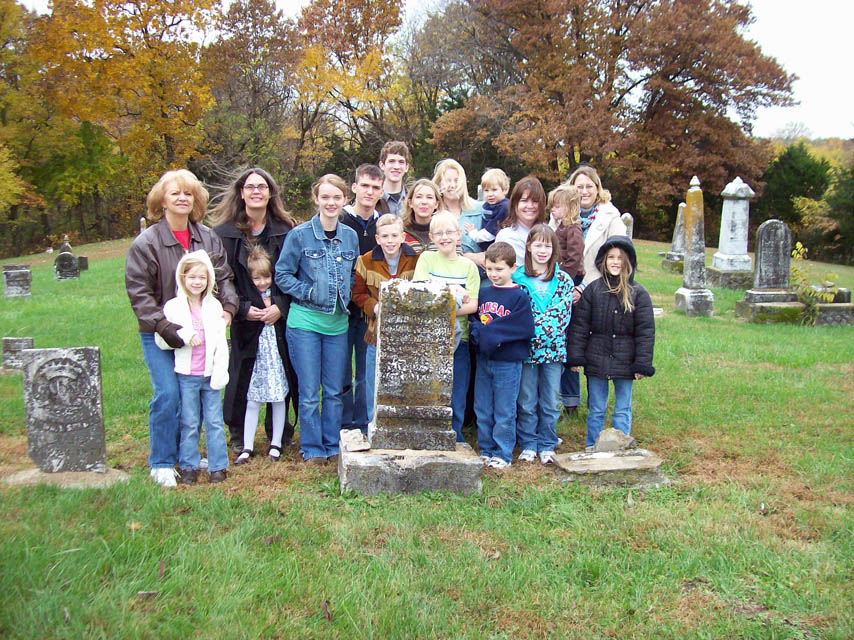
Kansas City Area Homeschool Group Outing, Visiting The Grave Of Allen Wright
Thanks to Bill Goring For Photo
![]()
Special Thanks: It is always a pleasure to know when people show interest in restoration history. One group of homeschoolers in the Kansas City, Missouri area are getting connected with their religious heritage. I want to thank Bill Goring, minister of the Lee's Summit Church of Christ, and Chasity Heck one of the church members, for providing the photos and Dover church history on this page.
![]()